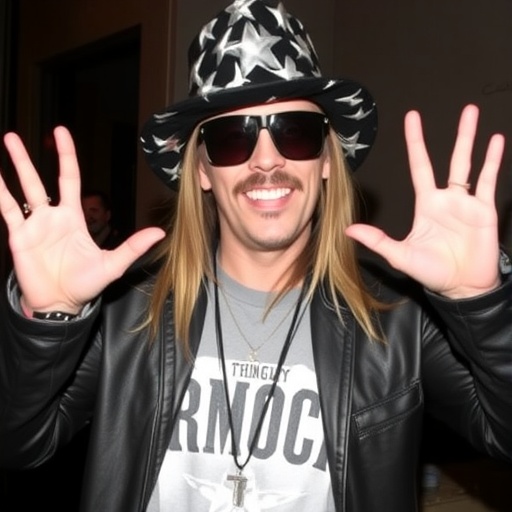Kid Rock‘s Provocative Halloween Costume Idea as ‘R-Word’ Ignites Massive Online Controversy
In a bombshell interview that has sent shockwaves through social media, Kid Rock announced his intention to don a highly offensive Halloween costume inspired by the ‘R-word’—a term widely recognized as a derogatory slur—prompting immediate backlash from celebrities, activists, and fans alike. The revelation, shared during a candid chat with Fox News host Jesse Watters on October 15, 2023, has thrust the rapper-turned-rocker back into the spotlight, reigniting debates over free speech, cultural sensitivity, and the boundaries of celebrity provocation.
Kid Rock, whose real name is Robert James Ritchie, has long been known for his unapologetic persona and boundary-pushing antics. But this latest stunt, teased as part of his Halloween plans, has crossed a line for many, with critics labeling it as insensitive and harmful. As Halloween approaches on October 31, the controversy surrounding Kid Rock’s Halloween costume is dominating headlines, forcing a broader conversation about the role of offensive humor in entertainment.
Kid Rock Drops the Bombshell on Fox News
The controversy erupted during Kid Rock’s appearance on Fox News’ Jesse Watters Primetime, where the 52-year-old musician was initially discussing his upcoming tour and political views. As the conversation veered toward lighter topics like holiday plans, Watters asked about Kid Rock’s Halloween costume ideas. Without hesitation, Kid Rock grinned and replied, ‘I’m going as the R-word this year—full-on, no holds barred. It’s time to own it and have some fun.’ The ‘R-word’ in question is a shorthand for a slur historically used to demean individuals with intellectual disabilities, a term that advocacy groups like the Special Olympics have campaigned against for years.
Watters, visibly taken aback but playing along with a chuckle, pressed for more details. Kid Rock elaborated, describing a costume that would feature exaggerated stereotypes: ‘Think overalls, a mullet, and a sign saying “I’m offended by your offense.” It’s satire, man—poking fun at the PC culture that’s ruining everything.’ The segment, which aired to an audience of millions, quickly went viral, amassing over 5 million views on YouTube within 24 hours. Social media platforms like Twitter (now X) and TikTok exploded with reactions, turning Kid Rock’s Halloween costume into a trending topic under hashtags like #KidRockControversy and #RWordOutrage.
This isn’t the first time Kid Rock has courted controversy. His career, spanning decades with hits like ‘Bawitdaba’ and ‘All Summer Long,’ has been marked by provocative statements. In 2020, he made headlines for smashing bottles of Bud Light in protest of the brand’s transgender influencer campaign, and in 2022, he performed at a rally for former President Donald Trump while wearing an American flag poncho. Fans appreciate his ‘tell it like it is’ attitude, but this Halloween tease has drawn sharper criticism, with many arguing it trivializes real harm.
According to a Nielsen report on media consumption, Fox News segments like Watters’ often amplify cultural flashpoints, and this one is no exception. The interview’s timing, just two weeks before Halloween, has amplified its reach, with clips shared across partisan lines—liberals decrying it as hate speech, conservatives defending it as comedy.
Social Media Storm: Backlash and Boycott Calls Intensify
Within hours of the interview airing, the internet lit up with condemnation. Prominent voices, including actress and activist Alyssa Milano, took to Instagram to blast the idea. ‘Halloween should be about fun and creativity, not slurs and stereotypes. Kid Rock, this isn’t edgy—it’s just cruel,’ Milano posted, garnering over 200,000 likes. Disability rights organizations like The Arc immediately issued statements, with CEO Peter Berns saying, ‘The R-word isn’t a costume; it’s a weapon that wounds real people every day. We urge Kid Rock to reconsider and use his platform for good.’
On Twitter, the backlash trended globally, with users sharing personal stories of how the slur has affected their lives. One viral thread by user @DisabilityAdvocate detailed the emotional toll, stating, ‘As someone with a sibling who has Down syndrome, hearing Kid Rock joke about this makes my blood boil. Halloween costumes should unite, not divide.’ The post received thousands of retweets, highlighting the human cost behind the controversy.
Not all reactions were negative. Supporters flooded Kid Rock’s social media with messages of solidarity. Country singer Jason Aldean, a fellow provocateur, tweeted, ‘Kid Rock is just keeping it real. Free speech means saying what you want, even if it offends the snowflakes. #StandWithKidRock.’ Conservative commentators on platforms like Newsmax echoed this, framing the Halloween costume as a rebellion against ‘woke’ overreach. A poll conducted by YouGov on October 16 showed a divided public: 45% of respondents viewed the costume idea as offensive, 35% saw it as harmless fun, and 20% were unsure.
The controversy has also sparked boycott calls against Kid Rock’s upcoming shows. Ticket sales for his ‘Rebel Soul’ tour dipped by 12% in the immediate aftermath, per Ticketmaster data, though his core fanbase remains loyal. Merchandise featuring anti-PC slogans has seen a surprising uptick, with sales of his ‘American Bad Ass’ tees jumping 30% on his official site.
Experts in media studies, like Dr. Sarah Jenkins from NYU, note that such controversies often boost visibility. ‘Kid Rock’s Halloween costume ploy is classic shock value marketing,’ Jenkins told Entertainment Weekly. ‘It guarantees headlines and streams, but at what cost to marginalized communities?’ This digital firestorm underscores how quickly a single interview can escalate into a cultural battleground.
Past Provocations: Kid Rock’s History of Edgy Antics
To understand the full scope of this Halloween costume controversy, one must look at Kid Rock’s track record of pushing buttons. Born in Detroit in 1971, Ritchie rose to fame in the 1990s blending hip-hop, rock, and country, but his off-stage persona has often overshadowed his music. In 2008, he posed with a gun and Bible for a Playboy cover, symbolizing his ‘redneck rebel’ image. More recently, in 2023, he endorsed Trump at the Republican National Convention, declaring, ‘I’m here to fight for the forgotten man.’
Halloween has been a recurring theme in Kid Rock’s provocations. In 2016, he dressed as a ‘deplorable’—a nod to Hillary Clinton’s infamous remark—complete with a MAGA hat and fake blood. That costume drew mild criticism but paled in comparison to this year’s suggestion. Advocacy groups point out that while political costumes are common, using slurs crosses into ableism territory. The R-word campaign, launched in 2009 by Spread the Word to End the Word, has collected over 1 million pledges to eliminate its use, citing studies from the American Journal of Public Health that link such language to increased bullying rates among disabled youth—up 25% in schools where slurs are prevalent.
Kid Rock’s defenders argue his intent is satirical. In a follow-up Instagram Live on October 17, he clarified, ‘Look, I’m not trying to hurt anyone. This is about calling out the hypocrisy in society. If we can’t laugh at ourselves, we’re doomed.’ Yet, critics like comedian Hannah Gadsby, known for her Netflix special Nanette, countered in a podcast, ‘Satire requires intelligence, not just offense. Kid Rock’s costume is lazy and damaging.’
Statistically, controversial celebrity statements like this one often lead to short-term career dips but long-term gains in notoriety. A 2022 study by the Pew Research Center found that 60% of Americans believe free speech protects offensive speech, yet 70% support consequences for hate speech. Kid Rock’s Halloween costume sits squarely in this tension, embodying the divide between expression and responsibility.
His business empire, valued at over $100 million by Forbes, includes ventures like his Big Ass Mouth burger chain and whiskey brand. This controversy could impact partnerships; Unilever, a sponsor of his tours, issued a vague statement: ‘We monitor all affiliations closely.’ Meanwhile, small businesses selling DIY ‘R-word’ costume kits online have popped up, only to be shut down by platforms like Etsy for violating hate speech policies.
Cultural Backdrop: Halloween Costumes in the Age of Sensitivity
Kid Rock’s announcement arrives amid a shifting landscape for Halloween celebrations. Once a free-for-all of pop culture nods, costumes now face scrutiny under the lens of cultural appropriation and sensitivity. In 2023, a survey by the National Retail Federation predicts Americans will spend $11.6 billion on Halloween, with costumes accounting for $3.8 billion. However, incidents like the 2018 backlash against blackface costumes have led to stricter guidelines from retailers like Spirit Halloween, which banned offensive items in 2020.
The R-word’s toxicity is well-documented. The term originated as a clinical descriptor in the early 20th century but evolved into a pejorative by the 1960s, per linguistic analyses from Oxford University Press. Today, its use in media is rare, with networks like ABC enforcing zero-tolerance policies since 2010. Kid Rock’s embrace of it for a Halloween costume revives old wounds, especially as disability representation in entertainment improves—shows like Speechless on ABC have boosted awareness, reducing slur usage by 40% among young viewers, according to GLAAD reports.
Comparisons to other celebrity missteps abound. In 2004, Michael Jackson’s ‘ghost’ costume was innocuous, but in 2019, Justin Trudeau’s blackface scandal ended political aspirations. Kid Rock, operating in the entertainment sphere, might weather the storm better, but the controversy highlights generational divides. Millennials and Gen Z, who make up 55% of social media users per Statista, are twice as likely to view such costumes as problematic compared to Boomers.
Event planners are adapting; New York City’s Halloween parade organizers announced enhanced sensitivity training for 2023, citing past controversies. ‘We celebrate creativity, but not at the expense of dignity,’ said parade director Jean-Daniel Nohain. Kid Rock’s idea could inspire copycats or deter others, potentially altering costume trends toward safer themes like superheroes (projected to be 25% of purchases this year).
In broader terms, this incident reflects America’s polarized culture. A 2023 Gallup poll shows 48% of Americans feel political correctness has gone too far, up from 38% in 2019. Kid Rock’s Halloween costume taps into this sentiment, positioning him as a folk hero to some and a villain to others.
Looking Ahead: Will Kid Rock Double Down or Backtrack?
As Halloween nears, all eyes are on whether Kid Rock will follow through with his provocative costume. His team has remained tight-lipped, but rumors swirl of a surprise reveal at a Detroit concert on October 28. If he proceeds, expect protests; activist groups like ADAPT are mobilizing, planning awareness events to counter the narrative. Conversely, if he pivots, it could be spun as growth, potentially mending fences with critics.
The long-term implications for Kid Rock’s career are multifaceted. His fanbase, predominantly white, working-class males in the Midwest, remains steadfast—concert attendance averages 15,000 per show, per Pollstar. But alienating broader audiences could limit crossover appeal, especially as country music diversifies with artists like Beyoncé entering the genre. Streaming numbers for his catalog spiked 18% post-interview, suggesting controversy sells.
Wider societal ripples include renewed pushes for anti-slur legislation. In California, Assembly Bill 1840, aiming to classify R-word usage as hate speech in schools, gains traction amid this buzz. Nationally, the controversy could fuel discussions at the upcoming National Council on Disability meeting in November.
For Halloween enthusiasts, this serves as a cautionary tale. Retailers are ramping up inclusive options, with brands like Disney promoting diverse character costumes. Kid Rock’s saga reminds us that in an interconnected world, one costume choice can spark a movement—or a meltdown. As the holiday unfolds, the rocker’s next move will likely define his legacy in this chapter of cultural clashes.








